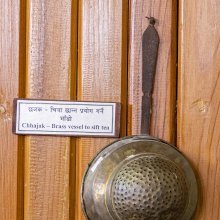Channa, Channā: 19 definitions
Introduction:
Channa means something in Buddhism, Pali, Hinduism, Sanskrit, Marathi, Jainism, Prakrit, Hindi, biology. If you want to know the exact meaning, history, etymology or English translation of this term then check out the descriptions on this page. Add your comment or reference to a book if you want to contribute to this summary article.
Alternative spellings of this word include Chhanna.
Images (photo gallery)
In Hinduism
Sports, Arts and Entertainment (wordly enjoyments)
Source: archive.org: Syainika Sastra of Rudradeva with English Translation (art)Channa (छन्न) refers to the “cover (of trees)” (useful during hunting), according to the Śyainika-śāstra: a Sanskrit treatise dealing with the divisions and benefits of Hunting and Hawking, written by Rājā Rudradeva (or Candradeva) in possibly the 13th century.—Accordingly, “Hunting by means of artifice (kālyā) is of four kinds [...]. (b) Mūlalagnikā is that in which animals are deceived and killed by many people standing under cover of trees (pādapa-cchanna) and gradually coming close to each other behind them”.

This section covers the skills and profiencies of the Kalas (“performing arts”) and Shastras (“sciences”) involving ancient Indian traditions of sports, games, arts, entertainment, love-making and other means of wordly enjoyments. Traditionally these topics were dealt with in Sanskrit treatises explaing the philosophy and the justification of enjoying the pleasures of the senses.
General definition (in Hinduism)
Source: WikiPedia: HinduismChanna (चन्न) : A royal servant and head charioteer of Prince Siddhartha, who was to become the Buddha.
In Buddhism
Theravada (major branch of Buddhism)
Source: Pali Kanon: Pali Proper Names1. Channa - A Wanderer, classed among those who wore clothes (paticchannaparibbajaka). He is only mentioned once, in the Anguttara Nikaya (A.iii.215), where we are told that he visited Ananda at Savatthi and asked him questions about the Buddhas teaching (see Channa Sutta below). Both the Sutta and the Commentary (AA.i.432) add that he was pleased with Anandas explanation, and admitted that the Buddhas teachings were worthy of being followed, though it is not explicitly stated that he accepted them.
2. Channa - A Thera. No particulars of his early life are available. He once stayed at Gijjhakuta, dangerously ill and suffering much pain. He was visited by Sariputta and Maha Cunda, and when they discovered that he contemplated suicide, they tried to deter him, promising to provide him with all necessaries and to wait on him themselves. Finding him quite determined, Sariputta discussed with him the Buddhas teachings and then left him. Soon afterwards Channa committed suicide by cutting his throat. When this was reported to the Buddha, he explained that no blame was attached to Channa, for he was an arahant at the moment of death (M.iii.263ff; S.iv.55ff).
Buddhaghosa explains (MA.ii.1012f.; SA.iii.12f ) that after cutting his throat, Channa, feeling the fear of death, suddenly realised that he was yet a puthujjana. This thought so filled him with anguish that he put forth special effort, and by developing insight became an arahant.
Channa had friends and relations in the Vajjian village of Pubbavijjhana (v.l. Pubbavajira), and came himself from there. v.l. Chandaka.
3. Channa - Gotamas charioteer and companion, born on the same day as Gotama (J.i.54; Mtu.ii.156, 164, 189, 233; iii.91, 262; BuA.233; SA.ii.231; DhsA.34. ThagA. (i.155) says he was the son of a servant woman of Suddhodana). When Gotama left household life, Channa rode with him on the horse Kanthaka as far as the river Anoma. There Gotama gave him his ornaments and bade him take Kanthaka back to his fathers palace (A thupa was later erected on the spot where Channa turned back; Dvy.391). When, however, Kanthaka died of a broken heart, Channas grief was great, for he had suffered a double loss. It is said that he begged for leave to join Gotama as a recluse, but this leave was refused (J.i.64f). He therefore returned to Kapilavatthu, but when the Buddha visited his Sakiyan kinsfolk, Channa joined the Order. Because of his great affection for the Buddha, however, egotistical pride in our Buddha, our Doctrine arose in him and he could not conquer this fondness nor fulfil his duties as a bhikkhu. (ThagA.i.155; his verse (No.69) quoted in Thag. does not, however, refer to any such remissness on his part).
Once, when in the Ghositarama in Kosambi, Channa committed a fault but was not willing to acknowledge it.
-- or --
A nun, Theravāda is a major branch of Buddhism having the the Pali canon (tipitaka) as their canonical literature, which includes the vinaya-pitaka (monastic rules), the sutta-pitaka (Buddhist sermons) and the abhidhamma-pitaka (philosophy and psychology).
Biology (plants and animals)
Source: Google Books: CRC World Dictionary (Regional names)1) Channa in India is the name of a plant defined with Cheilocostus speciosus in various botanical sources. This page contains potential references in Ayurveda, modern medicine, and other folk traditions or local practices It has the synonym Hellenia grandiflora Retz., nom. nud. (among others).
2) Channa is also identified with Cicer arietinum It has the synonym Ononis crotalarioides M.E. Jones, nom. illeg. (etc.).
3) Channa in South Africa is also identified with Mesembryanthemum tortuosum It has the synonym Mesembryanthemum tortuosum DC. (etc.).
Example references for further research on medicinal uses or toxicity (see latin names for full list):
· Bot. Handb.. (1796)
· Journal of Economic and Taxonomic Botany (1985)
· Nomenclator Botanicus (1840)
· Taxon (2006)
· Journal of Japanese Botany (1941)
· Fl. Trop. E. Africa, Leguminosae
If you are looking for specific details regarding Channa, for example diet and recipes, chemical composition, side effects, extract dosage, pregnancy safety, health benefits, have a look at these references.

This sections includes definitions from the five kingdoms of living things: Animals, Plants, Fungi, Protists and Monera. It will include both the official binomial nomenclature (scientific names usually in Latin) as well as regional spellings and variants.
Languages of India and abroad
Pali-English dictionary
Source: BuddhaSasana: Concise Pali-English Dictionarychanna : (adj.) proper; suitable. (pp. of chādeti) covered; concealed; thatched; given pleasure; relished.
Source: Sutta: The Pali Text Society's Pali-English Dictionary1) Channa, 2 (pp. to chad (chand), chandayati, see chādeti2) fit, suitable, proper Vin.II, 124 (+paṭirūpa); III, 128; D.I, 91 (+paṭirūpa); S.I, 9; M.I, 360; J.III, 315; V, 307; VI, 572; Pv.II, 1215 (=yutta PvA.159). (Page 275)
2) Channa, 1 (pp. of chad, see chādeti1) 1. covered J.IV, 293 (vāri°); VI, 432 (padara°, ceiling); ThA.257. ‹-› 2. thatched (of a hut) Sn.18.—3. concealed, hidden, secret J.II, 58; IV, 58.—nt. channaṃ a secret place Vin.IV, 220. (Page 275)

Pali is the language of the Tipiṭaka, which is the sacred canon of Theravāda Buddhism and contains much of the Buddha’s speech. Closeley related to Sanskrit, both languages are used interchangeably between religions.
Marathi-English dictionary
Source: DDSA: The Molesworth Marathi and English Dictionarychaṇṇa (छण्ण).—ad Imit. of a tinkling or jingling (as of the little bells on the toes &c.)
Source: DDSA: The Aryabhusan school dictionary, Marathi-Englishchaṇṇa (छण्ण).—ad Tinklingly.
Marathi is an Indo-European language having over 70 million native speakers people in (predominantly) Maharashtra India. Marathi, like many other Indo-Aryan languages, evolved from early forms of Prakrit, which itself is a subset of Sanskrit, one of the most ancient languages of the world.
Sanskrit dictionary
Source: DDSA: The practical Sanskrit-English dictionaryChanna (छन्न).—a. [chad-kta ni°]
1) Covered.
2) Hidden, concealed, secret &c.; see छद् (chad).
3) Desolate, solitary.
4) Private.
-nnam A secret; वागुराच्छन्नमाश्रित्य मृगाणामिष्यते वधः । भवाञ्छन्नेन दण्डितः (vāgurācchannamāśritya mṛgāṇāmiṣyate vadhaḥ | bhavāñchannena daṇḍitaḥ) Abhiṣeka.1.19.
Source: Cologne Digital Sanskrit Dictionaries: Shabda-Sagara Sanskrit-English DictionaryChanna (छन्न).—mfn.
(-nnaḥ-nnā-nnaṃ) 1. Private, secret. 2. Solitary. 3. Covered. E. chad to cover, affix kta.
Source: Cologne Digital Sanskrit Dictionaries: Cappeller Sanskrit-English DictionaryChanna (छन्न).—[adjective] covered, veiled, concealed, secret; [neuter] cover, secret place, also [adverb] = °— secretly, low.
Source: Cologne Digital Sanskrit Dictionaries: Monier-Williams Sanskrit-English Dictionary1) Channa (छन्न):—[from chad] a mfn. covered, covered over, [Mahābhārata iii, 800; Rāmāyaṇa i f.; Meghadūta; Bhāgavata-purāṇa] etc. (ifc. cf. [Pāṇini 6-2, 170])
2) [v.s. ...] obscured (the moon), [Mahābhārata i, 2699; Sūryasiddhānta iv, 10 and 22]
3) [v.s. ...] hidden, unnoticed by ([dative case]), secret, clandestine, disguised, [Mahābhārata iii f.; Rāmāyaṇa ii, v; Bhāgavata-purāṇa; Kathāsaritsāgara; Rājataraṅgiṇī]
4) [from chad] ind. (in [compound] nna-), [Rājataraṅgiṇī v, 467]
5) [v.s. ...] ind. (with √gai, to sing) privately, in a low voice, [Lāṭyāyana iii, 1, 12 ff.]
6) [from chanda] b See √1. chad.
Source: Cologne Digital Sanskrit Dictionaries: Yates Sanskrit-English DictionaryChanna (छन्न):—[(nnaḥ-nnā-nnaṃ) a.] Private, concealed.
Source: DDSA: Paia-sadda-mahannavo; a comprehensive Prakrit Hindi dictionary (S)Channa (छन्न) in the Sanskrit language is related to the Prakrit word: Chaṇṇa.
[Sanskrit to German]
Sanskrit, also spelled संस्कृतम् (saṃskṛtam), is an ancient language of India commonly seen as the grandmother of the Indo-European language family (even English!). Closely allied with Prakrit and Pali, Sanskrit is more exhaustive in both grammar and terms and has the most extensive collection of literature in the world, greatly surpassing its sister-languages Greek and Latin.
Hindi dictionary
Source: DDSA: A practical Hindi-English dictionaryChannā (छन्ना) [Also spelled chhanna]:—(nm) a filter; a piece of tattered cloth.
...
Prakrit-English dictionary
Source: DDSA: Paia-sadda-mahannavo; a comprehensive Prakrit Hindi dictionary1) Chaṇṇa (छण्ण) in the Prakrit language is related to the Sanskrit word: Channa.
2) Channa (छन्न) also relates to the Sanskrit word: Kṣaṇa.
Prakrit is an ancient language closely associated with both Pali and Sanskrit. Jain literature is often composed in this language or sub-dialects, such as the Agamas and their commentaries which are written in Ardhamagadhi and Maharashtri Prakrit. The earliest extant texts can be dated to as early as the 4th century BCE although core portions might be older.
Kannada-English dictionary
Source: Alar: Kannada-English corpusChanna (ಛನ್ನ):—[adjective] covered; concealed; veiled; incognito.
--- OR ---
Channa (ಛನ್ನ):—[noun] the condition or an instance of hiding or being without revealing one’s identify; incognito.
Kannada is a Dravidian language (as opposed to the Indo-European language family) mainly spoken in the southwestern region of India.
See also (Relevant definitions)
Starts with (+34): Canna-kirrurupay, Canna-lavankapattai, Canna-turukkuvempu, Canna-valaipu, Cannacalai, Cannacalaikkatuku, Cannacalam, Cannacam, Cannaccampa, Cannacilampuri, Cannaicayikkinai, Cannaikonnai, Cannakarai, Cannakkaccolam, Cannakkampi, Cannakkata, Cannakkentai, Cannal, Cannalilai, Cannalpinnal.
Ends with (+34): Abhicchanna, Acchanna, Aparicchanna, Apracchanna, Ardhasamcchanna, Arjunarishtasamchanna, Asamchanna, Avacchanna, Bhasmacchanna, Dharmashatapraticchanna, Ekacchanna, Hemacchanna, Hemachanna, Hemajalapraticchanna, Himacchanna, Karchanna, Kolchanna, Lingapracchanna, Marunchanna, Meghacchanna.
Full-text (+43): Chad, Channam, Chadita, Ragachanna, Samchanna, Chaṇa, Channa Sutta, Pracchannabhartri, Somanadeva, Channovada Sutta, Channe, Ducchana, Senasandayaka, Paricchanna, Kshana, Pacchanna, Ucchanna, Chanda, Tinasantharaka, Lohamasa.
Relevant text
Search found 43 books and stories containing Channa, Channā, Chaṇṇa; (plurals include: Channas, Channās, Chaṇṇas). You can also click to the full overview containing English textual excerpts. Below are direct links for the most relevant articles:
Manusmriti with the Commentary of Medhatithi (by Ganganatha Jha)
Verse 9.100 < [Section X - Impropriety of the Nuptial Fee]
Verse 9.98 < [Section X - Impropriety of the Nuptial Fee]
Dhammapada (Illustrated) (by Ven. Weagoda Sarada Maha Thero)
Verse 78 - The Story of Venerable Channa < [Chapter 6 - Paṇḍita Vagga (The Wise)]
Verse 194 - The Story of Many Monks < [Chapter 14 - Buddha Vagga (The Buddha)]
Verse 117 - The Story of Venerable Seyyasaka < [Chapter 9 - Pāpa Vagga (Evil)]
Vinaya Pitaka (1): Bhikkhu-vibhanga (the analysis of Monks’ rules) (by I. B. Horner)
Monks’ Expiation (Pācittiya) 12
Monks’ Expiation (Pācittiya) 54
Vinaya Pitaka (3): Khandhaka (by I. B. Horner)
On the higher penalty < [21. (Recitation with) Five Hundred (Pañcasata)]
An act of suspension for not seeing an offence < [11. The followers of Paṇḍuka and Lohitaka (Paṇḍulohitaka)]
An act of suspension for not making amends for an offence < [11. The followers of Paṇḍuka and Lohitaka (Paṇḍulohitaka)]
Vinaya (3): The Cullavagga (by T. W. Rhys Davids)
Cullavagga, Khandaka 1, Chapter 25 < [Khandaka 1 - The Minor Disciplinary Proceedings]
Cullavagga, Khandaka 1, Chapter 28 < [Khandaka 1 - The Minor Disciplinary Proceedings]
Cullavagga, Khandaka 11, Chapter 1 < [Khandaka 11 - On the Council of Ragagaha]
The Lingayats-Their Religion and Literature < [May 1937]
‘The Triple Stream’ < [April 1956]
‘The Triple Stream’ < [April 1956]
Related products

